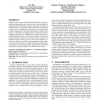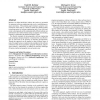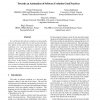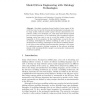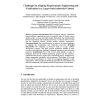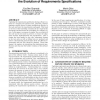112
click to vote
SIGSOFT
2010
ACM
15 years 4 hour ago
2010
ACM
Although much progress has been made in software verification, software testing remains by far the most widely used technique for improving software reliability. Among various typ...
SIGSOFT
2010
ACM
15 years 4 hour ago
2010
ACM
Reliance on skilled developers reduces the return on investment for important software engineering tasks such as establishing program correctness. This position paper introduces a...
109
click to vote
SIGSOFT
2010
ACM
15 years 4 hour ago
2010
ACM
Software is a critical enabling technology in nearly all aspects of climate change, from the computational models used by climate scientists to improve our understanding of the im...
102
click to vote
SIGSOFT
2010
ACM
15 years 4 hour ago
2010
ACM
Free/Open Source Software (FOSS) development is not the same an Software Engineering (SE). Why this is so is unclear and open to various interpretations. Both address the challeng...
139
click to vote
SEKE
2010
Springer
15 years 7 hour ago
2010
Springer
It is well known that software evolution is an inescapable activity in the software lifecycle. In order to prevent the negative effects of this activity (decreased quality, increa...
141
click to vote
RWEB
2010
Springer
15 years 11 hour ago
2010
Springer
Ontologies constitute formal models of some aspect of the world that may be used for drawing interesting logical conclusions even for large models. Software models capture relevant...
185
click to vote
REFSQ
2010
Springer
2010
Springer
Challenges in Aligning Requirements Engineering and Verification in a Large-Scale Industrial Context
15 years 11 hour ago
[Context and motivation] When developing software, coordination between different organizational units is essential in order to develop a good quality product, on time and within b...
136
click to vote
KBSE
2010
IEEE
15 years 1 days ago
2010
IEEE
Scientists today conduct new research via software-based experimentation and validation in a host of disciplines, including materials science, life sciences, astronomy, and physic...
114
click to vote
IWPSE
2010
IEEE
15 years 1 days ago
2010
IEEE
Updating the requirements specification during software evolution is a manual and expensive task. Therefore, software engineers usually choose to apply modifications directly to t...
133
click to vote
IPPS
2010
IEEE
15 years 1 days ago
2010
IEEE
Unplanned system outages have a negative impact on company revenues and image. While the last decades have seen a lot of efforts from industry and academia to avoid them, they stil...
